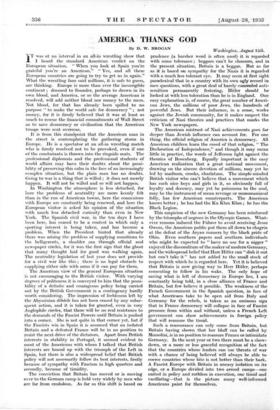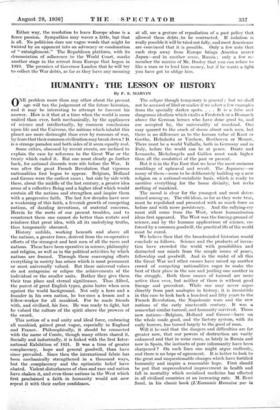AMERICA THANKS GOD
By D. W. BROGAN
Washington, Augu.si
IT was at an interval in an all-in wrestling show that I heard the standard American verdict on the European situation. " When you look at Spain you're grateful you're an American." " Yes, and all these European countries are going to try to get us in again." What the wrestling fans said millions, it is safe to guess, are thinking. Europe is more than ever the incorrigible resolved, will add neither blood nor money to the mess.
Not blood, for that has already been spilled to no purpose " to make the world safe for democracy " ; not money, for it is firmly believed that it was at least as much to rescue the financial commitments of Wall Street as to save democracy or civilisation that the American troops were sent overseas.
It is from this standpoint that the American man in the street is contemplating the gathering storm in Europe. He is a spectator at an all-in wrestling match who is firmly resolved not to be provoked, even if one of the combatants is thrown into the ringside seats. The professional diplomats and the professional students of world affairs may have their doubts about the possi- bility of preserving this calm in the face of an increasingly complex situation, but the plain man has no doubts. Going to war is a thing that is willed ; it does not merely happen. It will not be willed and so will not happen.
In Washington the atmosphere is less detached, for here the problems of neutrality are more keenly felt than in the run of American towns, here the connexions with Europe are constantly being renewed, and here the European visitor is asked his opinion of the situation with much less detached curiosity than even in New York. The Spanish civil war, in the ten days I have been here, has ceased to be a contest in which only a sporting interest is being taken, and has become a problem. When the President hinted that already there was arising the problem of supplying munitions to the belligerents, a shudder i-an through official and newspaper circles, for it was the first sign that the ghost that many thought laid for good was walking again.
The neutrality legislation of last year does not provide for a civil war like this ; there is no legal obstacle to supplying either side with arms if it can pay for them.
The American view of the general European situation is not encouraging to the British visitor. With varying degrees of politeness it is conveyed to him that the possi- bility of a definite and courageous policy being carried out by the British Government is a contingency hardly worth considering. The impression of feebleness left by the-Abyssinian debdcle has not been erased by any subse- quent action, and it is taken for granted, even in very Anglophile circles, that there will be no real resistance to the demands of the Fascist Powers until Britain is pushed into a corner. She is not quite in that corner yet, but if the Fascists win in Spain it is assumed that an isolated Britain and a defeated France will be in no position to resist the next drive of the dictators. Apart from British interests in stability in Portugal, it seemed evident to most of the Americans with whom I talked that British interests are bound up with the triumph of the Left in Spain, but there is also a widespread belief that British policy will not necessarily follow its best interests, firstly because of sympathy with Fascism in high quarters and secondly, because of timidity.
The conviction that Britain has moved or is moving over to the German camp is held very widely by men who are far from credulous. As far as this shift is based on prudence (a harsher word is often used) it is regarded with some tolerance ; beggars can't be choosers, and in the present situation, Britain is a beggar. But as far as it is based on sympathy for the Nazis it is regarded with a much less tolerant eye. It may seem at first sight paradoxical that in a country with its own ugly record in race questions, with a great deal of barely congealed anti- semitism permanently festering, Hitler should be looked at with less toleration than he is in England. One easy explanation is, of course, the great number of Ameri- can Jews, the millions of poor Jews, the hundreds of powerful Jews. But their influence, in a sense, works against the Jewish community, for it makes suspect the criticism of Nazi theories and practices that marks the New York newspapers.
The American mistrust of Nazi achievements goes far deeper than Jewish influence can account for. For one thing, the official religion of America is democracy. All American children learn the creed of that religion, " The Declaration of Independence," and though it may mean little in practice, the words of Jefferson fight against the theories of Rosenberg. Equally important is the easy American realisation that a great national movement, drawing on the sincere devotion of millions, may yet be led by madmen, crooks, charlatans. The simple-minded British visitor who can't believe that a movement which has such nice boys and girls in it, so obviously full of loyalty and decency, may yet be poisonous to the soul, may be the instrument of mean revenge or monomaniacal folly, has few American counterparts. The American knows better ; he has had the Ku Klux Klan ; he has the Black Legion.
This suspicion of the new Germany has been reinforced by the triumphs of negroes in the Olympic Games. What- ever reasons induced the Fiihrer to avoid receiving Jesse Owens, the American public put them all down to chagrin at the defeat of the Aryan runners by the black pride of Ohio. Even southern papers and southern individuals who might be expected to " have no use for a nigger " enjoyed the discomfiture of the maker of modern Germany, and the widespread belief that Herr Hitler can " dish it out but can't take it " has not added to the small stock of respect with which he is regarded here. Yet it is believed that Britain is now giving way to Herr Hitler, perhaps consenting to follow in his wake. The only hope of saving what is left of democracy in Europe lies, I am constantly being told, in a close alliance of France and Britain, but few believe it possible. The weakness of the French Government in the Spanish question, in face of what Americans take to be open aid from Italy and Germany for the rebels, is taken as an ominous sign that in France democracy will collapse in face of Fascist pressure from within and without, unless a French Left government can show achievements in foreign policy that will reassure the timid.
Such a reassurance can only come from Britain, but Britain having shown that her bluff can be called by Mussolini, is in no position to reassure France or intimidate Germany. In the next year or two there must be a show- down, or a more or less graceful recognition of the fact. that the countries whose leaders can use threats of war with a chance of being believed will always be able to coerce countries whose bite is not better than their bark. A Fascist Europe with Britain in uneasy isolation on its edge, or a Europe divided into two armed camps—one united in policy and ruthless in execution, one timid and vacillating—that is the picture many well-informed Americans paint for themselves. Either way, the resolution to leave Europe alone is a fierce passion. Sympathies may waver a little, hat .that is all. No politician dare use vague words that might be twisted by an opponent into an advocacy or condonation of " ehttinglement." 'The Republican platform, with its denunciation of adherence to the World Court, marks another stage in the retreat from Europe that began in 1919. The promises of Governor Landon that he will try to collect the War debts, as far as they have any meaning at all, are a gesture of repudiation of a past policy that allowed these debts to be contracted. If isolation is really possible it will be tried out fully, and most Americans are convinced that it is possible. Only a few note that each step away from Europe brings America nearer Japan-:–and in another sense, Russia ; only a few re- member the maxim of Mr. Dooley that you can refuse to like a man or to lend him money, but if he wants a fight you have got to oblige him.







































 Previous page
Previous page